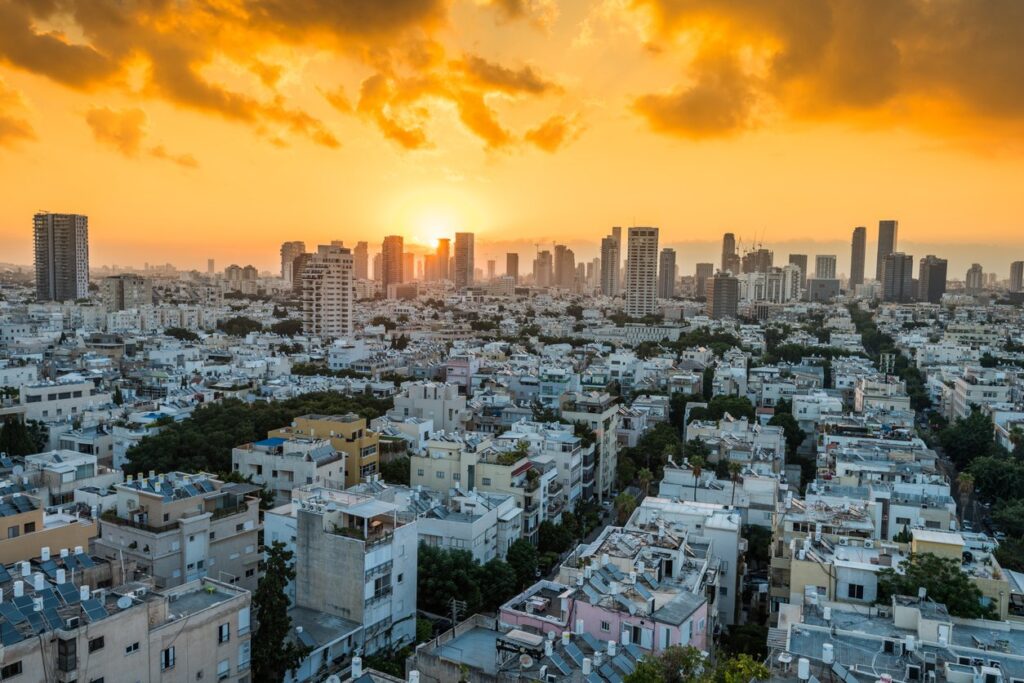NepalIsrael.com auto goggle feed
For years, most Israelis treated the idea that home values will always rise as a fundamental economic assumption, inevitable as death or taxes.
But after years of war, steadily high interest rates, decades in which prices climbed inexorably, and a record supply of unsold new housing, some think the market may have finally peaked, at least for now.
“There’s a limit to how much people can pay,” said Yitzchak Kowalsky, CEO of YKK Jerusalem Real Estate. “I work with a lot of very wealthy people, and they are telling me they’re not willing to pay the prices people are asking now.”
In July, Israel saw home prices fall for a fifth consecutive month, dropping by some 1.5 percent since March, according to data from the Central Bureau of Statistics. However, preliminary data for August showed a 0.8 % rebound. The market is still up more than 2% over the past year.
Fewer homes are also being sold. After peaking in December 2024, home sale volumes have been declining every month compared to the previous year, according to Finance Ministry data.
The months of sliding prices have not done much to dent the approximately 40% spike in home prices experienced over the last five years in Israel, which has been one of the fastest-growing real estate markets in the world for much of the past two decades. But with large amounts of money riding on the assumption of consistently rising prices, many, including homeowners, developers and banks, are scrambling to understand whether the trend reflects deeper changes in the market.
Noah Sander, an agent at Daon Group Real Estate in Tel Aviv, said he believes the market is undergoing a correction, not a collapse.
“During COVID, sellers wouldn’t even talk to you if you wanted to negotiate on the asking price,” Sander said. “Now, people are being more flexible behind the scenes.”
But others are concerned that the economic toll of the war in Gaza and elsewhere, and Israel’s increasing international isolation, are starting to filter into the real estate market.
“There is no question that the war has a significant impact on the economy, and that directly affects the real estate market,” said Prof. Zvi Wiener of the Hebrew University Business School. “Between the government costs of running a war, increased uncertainty in the market and people losing their jobs, it is natural that prices will go down.”
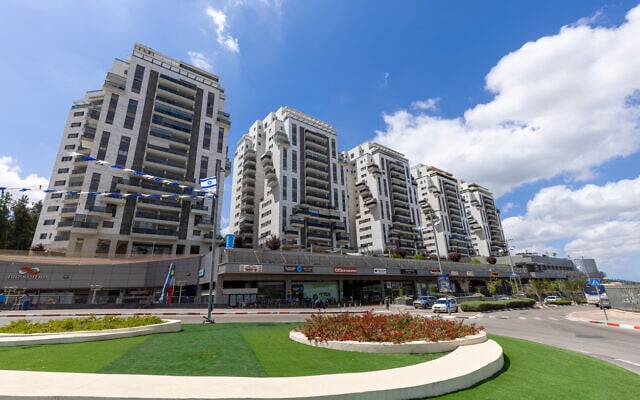
An illustrative photo of new residential towers in Beit Shemesh, April 2022. (Elijah Lovkoff via iStock by Getty Images)
One group still willing to buy up homes in Israel — either as investments or for a rainy day — are Jews overseas, amid concerns of rising antisemitism, said Kim Bash, who runs an agency in Jerusalem.
“I’ve only seen an increase in sales to American Jews since the war started,” Bash said. “People get a sense of security knowing that they have a foothold here, and they believe that the future of the Jewish people is in Israel.”
Beyond the war
According to Sander, the official data simply reflects a downward trend in the market since before October 7, 2023.
“I work mainly in Tel Aviv, and we had already started to see a slowdown in the market for second-hand homes at the beginning of 2023, before the war,” Sander said. “Prices already started falling then, even if the official data wasn’t showing it. Now, I would say prices for second-hand apartments are down 15-20% from their peak.”
Listing prices often don’t reflect the actual market demand, Sander said.
“Many owners are still living in 2021, 2022, when the market peaked, hoping they’ll get the types of prices they heard about then,” Sander said. “But the reality today is different.”
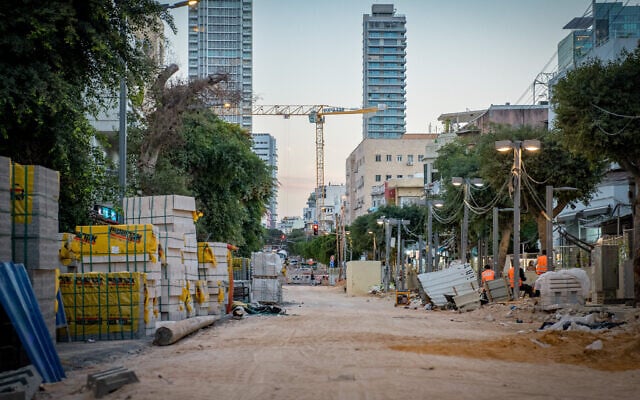
Illustrative: Construction of the new Tel Aviv Light Rail, on Allenby Street in Tel Aviv, November 18, 2024. (Israel Hadari/Flash90)
Some of the reasons are economic. The cost of borrowing has shot up since mid-2022, with the benchmark interest rate now 4.5% after years at a historic low of 0.1%. The dollar has weakened against the shekel in recent months, and now trades below NIS 3.35 compared to NIS 3.78 a year ago, which is significant for overseas buyers.
After years of complaints of housing shortages, developers are now building in large cities at a frenzied pace, creating a glut of high-priced new homes where supply may be starting to outstrip demand. There are currently nearly 83,000 new apartments available for sale, a record level, according to the CBS.
“There is more stock of new apartments available than ever before, and loads of projects that will be ready to move into in the next three years,” Sander said. “Many developers are starting to drop prices or be a lot more flexible in negotiations.”
Policy decisions may also be slowing home sales.
Israel raised the VAT sales tax at the end of 2024 from 17% to 18%, hiking costs for homebuyers.
The Bank of Israel has also imposed restrictions on contractors offering financing packages that allowed buyers to defer paying most of the purchase price until construction was completed.
The scheme, seen as a stopgap measure to alleviate buyers’ aversion to risk, proved so popular that it began posing a risk to the country’s banking system, leading the central bank to clamp down in March.
However, even if the war can’t be blamed for causing a slowdown, its uncertainties have clearly compounded the decline in demand, Sander said.
“People want to wait until the war is over to buy, even though that’s probably when prices will go up again,” he noted. “When the Iran war started, a lot of people who were finally ready to buy said, ‘Okay, maybe I’ll wait a bit more,’ even if that’s the exact opposite of what they should be doing.”
According to Kowalsky, homes without reinforced protected rooms, or at least access to a shared bomb shelter, command little demand.
“It used to be that the first thing people asked about would be parking. Now, it’s whether there is a [protected room],” Kowalsky said. “If there isn’t, you’re talking about a price deduction of 15-20%.”
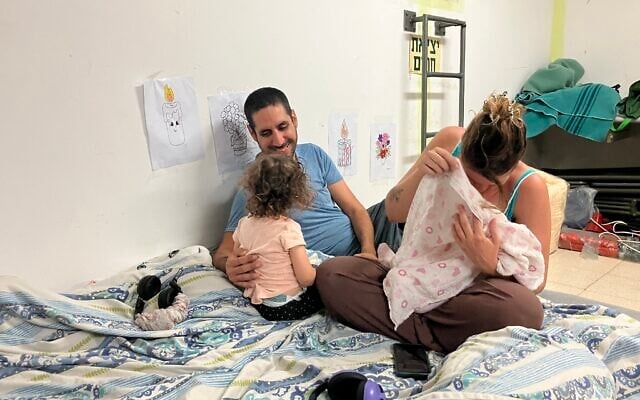
Hagar Amor, right, nurses her baby while her husband, Tal, sits with their daughter Gaia in a public shelter in Shavei Zion on June 17, 2025 (Diana Bletter/Times of Israel)
Those willing to buy older apartments are increasingly interested only if there is a good chance that the building will be torn down and rebuilt in the near future, as part of urban renewal plans under which developers replace aging apartment buildings, providing existing homeowners with brand new homes in exchange for the rights to add and sell additional units.
“People are interested in these because they know they are going to get a larger brand-new place in a few years, so they rent it out in the meantime,” Kowalsky said. “Everyone wants to take a cut from that.”
Overseas interest
All the real estate agents The Times of Israel spoke with agreed that interest in the Israeli market is still strong among overseas buyers.
“There’s an astounding level of interest right now, even if not everyone is ready to pull the trigger,” Sander said. “A lot of people are concluding that their home countries may not be safe for them and their children, and they’re making moves to secure their future.”

Real estate agent Kim Bash (Courtesy)
Bash agreed. “People have a heightened awareness of the need to own in Israel due to the rising antisemitism abroad,” she said.
In addition to Jerusalem and Tel Aviv, agents said that cities like Ashkelon and Netanya are becoming more popular among English-speaking buyers. Outside the large cities, communities are also developing in Modiin, Beit Shemesh, Pardes Hana, Karmiel and Carmei Gat.
In Jerusalem, demand for homes in central neighborhoods such as the German Colony, Rehavia and Talbieh will always be strong, Kowalsky added.
Bash noted that many foreign buyers now purchase homes at Israeli real estate fairs organized in communities around the Jewish world.
“People who do that don’t really understand what they are buying, and they end up disappointed,” she said.
“People really want to become part of a community,” Bash added. “When you find a community, that’s when you really have a home here.”
Forecasting the future
Regarding the market after Israel’s war with Hamas comes to an end, there are a variety of different outlooks.

Prof. Zvi Wiener of the Hebrew University Business School (Michal Ravivo)
Wiener, the finance professor, was worried about the most pessimistic scenario.
“It is possible that the entire economy — including the real estate market– could fall into a long economic downturn,” he said. “This would depend on many factors, including the length of the war, international diplomacy and the costs of rebuilding once the fighting is over,” he said. The Israeli economy is strong structurally, but a serious decline “is not a negligible possibility,” he said.
Sander was more optimistic. “I think there will be a natural euphoria when the war ends, and a lot of people will buy, driving prices back up,” he said. “If the central bank lowers interest rates, that would add a further jolt to the market.”
While Israeli construction companies experienced labor shortages after the outbreak of the war due to travel restrictions on Palestinians from the West Bank, most large players now have enough workers to continue building at full speed.
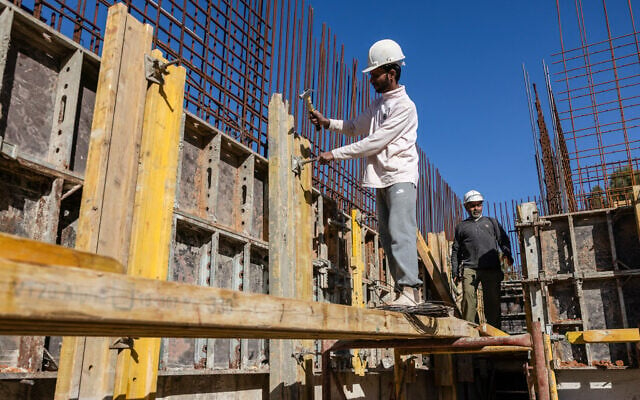
Indian builders work on a construction site in Tel Aviv on December 15, 2024. (Menahem KAHANA / AFP)
“Some of the smaller developers were hit hard by labor shortages, but the big guys have their own crews and were able to return to normality relatively quickly.”
Kowalsky said overseas buyers are more likely to base their decisions more on macroeconomics than on the war itself.
“If interest rates go down and the dollar is strong, more buyers will come to the market,” he suggested. “Otherwise, they might not.”
“I don’t think the war is really a factor,” he added.
The post”Israel’s home prices have finally started falling. It’s not only about the Gaza war” is auto generated by Nepalisrael.com’s Auto feed for the information purpose. [/gpt3]



